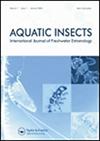Odonata as bioindicator for monitoring anthropogenic disturbance of Owabi wetland sanctuary, Ghana
IF 0.5
4区 农林科学
Q4 ENTOMOLOGY
引用次数: 1
Abstract
Abstract This study proposes a method for assessing anthropogenic disturbance in the Owabi wetland sanctuary in Ghana using Odonata. Uniqueness of a species to specific land use (LU) class and its tolerance to environmental conditions served as the criteria for the monitoring. Twenty-nine species were identified from the families Aeshnidae, Libellulidae, Chlorocyphidae, Calopterygidae and Coenagrionidae. A Kruskal-Wallis’s test suggest significant difference in species richness across the anthropogenic disturbance regimes. Pantala flavescens (Fabricius, 1798) was identified as an indicator of high anthropogenic disturbance; Orthetrum abbotti Calvert, 1892 and Africallagma vaginale (Sjöstedt, 1917) were indicators of moderate anthropogenic disturbance; and Gynacantha bullata Karsch, 1891, Tramea limbata (Desjardins, 1832), Olpogastra lugubris Karsch, 1895, Neodythemis klingi (Karsch, 1890), Brachythemis leucosticta (Burmeister, 1839), Chlorocypha curta (Hagen in Sélys, 1853), Chlorocypha luminosa (Karsch, 1893), Chlorocypha radix Longfield, 1959 and Agriocnemis sp. were identified as indicators of low anthropogenic disturbance.Ododata作为监测加纳Owabi湿地保护区人为干扰的生物指标
摘要本研究提出了一种利用Odonata评估加纳Owabi湿地保护区人为干扰的方法。物种对特定土地利用类别的独特性及其对环境条件的耐受性是监测的标准。共鉴定出29种,分别隶属于Aeshnidae、Libellulidae、Chlorocyphidae、Caloptrygidae和Coenagrionidae。Kruskal-Wallis的测试表明,在不同的人为干扰制度下,物种丰富度存在显著差异。黄潘塔拉(Fabricius,1798)被确定为高人为干扰的指标;Orthetrum abbotti Calvert,1892年和Africallagma vaginale(Sjöstedt,1917年)是中度人为干扰的指标;和Gynacantha bullata Karsch,1891,Tramea limbata(Desjardins,1832),Olpogastra lugubris Karsch(1895),Neodythemis klingi(Karsch),Brachythemis leucostica(Burmeister,1839),Chlorocypha curta(Hagen in Sélys,1853),Chloocypha luminosa(Karsch,1893),Chlorocypha radix Longfield(1959)和Agriocnemis sp.被确定为低人为干扰的指标。
本文章由计算机程序翻译,如有差异,请以英文原文为准。
求助全文
约1分钟内获得全文
求助全文
来源期刊

Aquatic Insects
生物-昆虫学
CiteScore
2.00
自引率
25.00%
发文量
27
审稿时长
>12 weeks
期刊介绍:
Aquatic Insects is an international journal publishing original research on the systematics, biology, and ecology of aquatic and semi-aquatic insects.
The subject of the research is aquatic and semi-aquatic insects, comprising taxa of four primary orders, the Ephemeroptera, Odonata, Plecoptera, and Trichoptera but also aquatic and semi-aquatic families of Hemiptera, Coleoptera, and Diptera, as well as specific representatives of Hymenoptera , Lepidoptera, Mecoptera, Megaloptera , and Neuroptera that occur in lotic and lentic habitats during part of their life cycle. Studies on other aquatic Hexapoda (i.e., Collembola) will be only accepted if space permits. Papers on other aquatic Arthropoda (e.g., Crustacea) will not be considered, except for those closely related to aquatic and semi-aquatic insects (e.g., water mites as insect parasites).
The topic of the research may include a wide range of biological fields. Taxonomic revisions and descriptions of individual species will be accepted especially if additional information is included on habitat preferences, species co-existing, behavior, phenology, collecting methods, etc., that are of general interest to an international readership. Descriptions based on single specimens are discouraged.
Detailed studies on morphology, physiology, behavior, and phenology of aquatic insects in all stadia of their life cycle are welcome as well as the papers with molecular and phylogenetic analyses, especially if they discuss evolutionary processes of the biological, ecological, and faunistic formation of the group.
 求助内容:
求助内容: 应助结果提醒方式:
应助结果提醒方式:


